Heritage Senior Living
Memory Care
Heritage Senior Living’s Memory Care communities in Wisconsin provide specialized attention and care for those experiencing Alzheimer’s disease or other forms of dementia. No matter if you or a loved one are in need of dementia care in Milwaukee, Madison, Green Bay, or anywhere else in Wisconsin, Heritage has just what you need! Each prospective resident receives a thorough assessment upon admission, ensuring their unique needs are met. Specially trained staff members are on-hand 24/7 to provide compassionate, individualized dementia care.
Our Commitment to Innovative
Memory Care Technology
Fall Detection Technology
Vayyar Care’s technology ensures that whenever a fall is detected, caregivers are immediately alerted, resulting in timely, efficient, and quality care! Play Video
Smart Bathroom Technology
TrueLoo is a smart bathroom technology system designed to provide our clinical team with advanced information on the health and well-being of our residents! Play Video
Wellbeing Technology
Tools at the fingers tips of our caregivers and families to provide more individualized support and engagement for our residents than ever before!
Types of Dementia Care
in Wisconsin

Alzheimer’s Care
in Wisconsin
Alzheimer’s Dementia affects thinking, memory, and behavior. It’s important to have an individualized care plan specific to each resident, accomplished through MapHabit. Compassionate caregivers are essential to help you or your loved one complete daily tasks and live life to the fullest! Check out our expert medical treatment, cutting edge tools, and interactive memory therapies today!
Vascular Dementia Care
in Wisconsin
Vascular Dementia is a decline in thinking skills caused by blocked or reduced blood flow to the brain, depriving it of oxygen and nutrients, and these conditions are typically caused suddenly by something like a stroke. This type of dementia can mirror Alzheimer’s through memory loss, or symptoms can vary through headaches, difficulty walking, poor balance, and more. No case of vascular dementia is the same; which is why tailoring a specialized memory care plan to each and every person is so important!
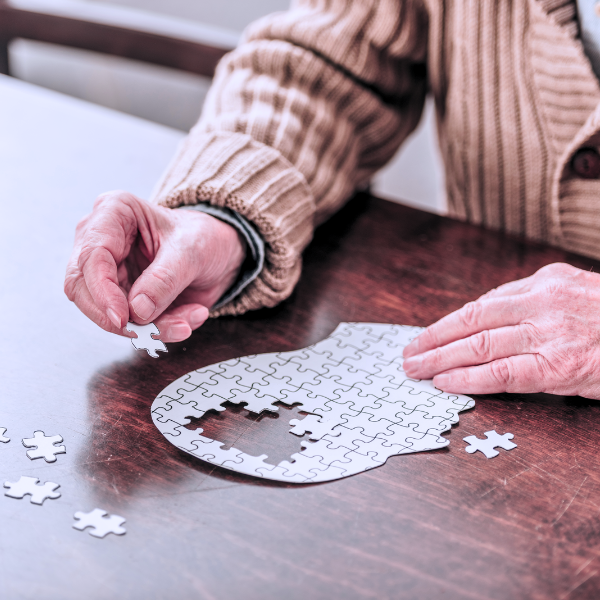
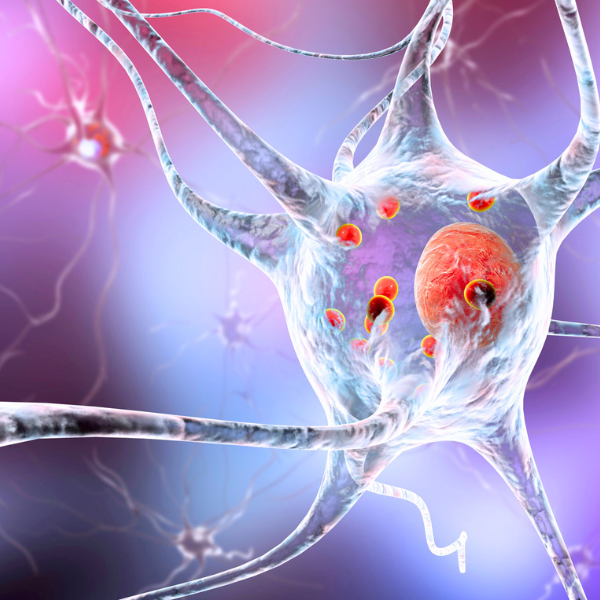
Lewy Body Dementia Care
in Wisconsin
One of the most common causes of dementia, Lewy Body Dementia is associated with abnormal deposits of protein in the brain, affecting its chemicals, which in turn leads to problems with thinking, movement, behavior, and mood. Although visual hallucinations, unpredictable changes in concentration and alertness, and sleep disorders are telltale signs of LBD, symptoms can wildly vary and often go misdiagnosed. Because LBD is a progressive disorder, it’s imperative that you or your loved one is surrounded by professionals who are able to identify signs and symptoms, so that care plans can be adjusted as needed.
Frontotemporal Dementia Care
in Wisconsin
Frontotemporal Dementia is actually a group of disorders that occur when the nerve cells of the frontal and temporal lobes of the brain are lost and cause the lobes to shrink. Not only can FTD affect movement, language, and behavior, but it can affect personality as well. FTD is progressive, and common symptoms can include dramatic personality or behavior changes, socially inappropriate behaviors, impaired judgement, decreased self awareness, loss of motivation, easy agitation, and more. Some of these symptoms can be hard to spot, so it’s important to have an experienced team of experts around to identify them!
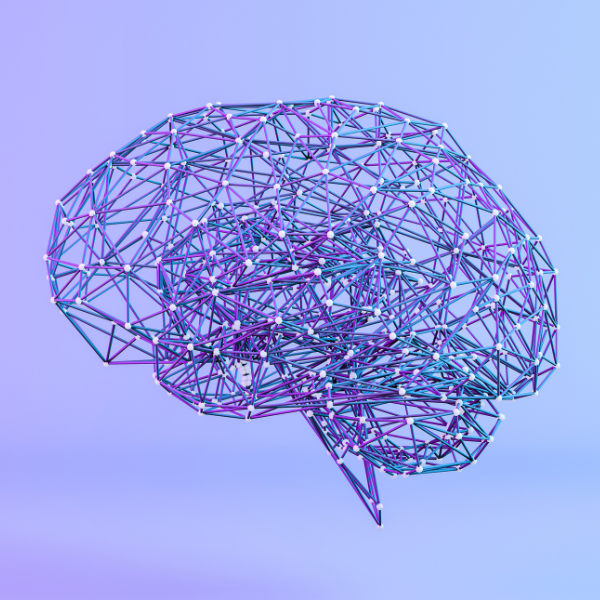
Animal Assisted Therapy
Through our unique Heritage Hounds program, our Wisconsin Memory Care residents can participate in making and packaging dog biscuits. Making these biscuits allows our residents to engage with each other, while also fostering a sense of pride and accomplishment. The program creates an atmosphere of ability and a feeling of confidence in our residents.
Monthly Activities Calendar
One much-loved aspect of our Dementia Care program is the Wisconsin Heritage Monthly Calendar, which provides themed months during which our memory care residents can participate in different Wisconsin-focused activities. Each week, Heritage offers new activities for both residents and their loved ones to enjoy. Engaging in these activities not only allows our residents to experience a sense of togetherness, but allows them the chance to learn, thrive and grow.
Honoring Life Stories
When a new resident joins one of Heritage’s Memory Care communities, a life enrichment specialist interviews family members to create the resident’s “life story,” which includes memories and preferences about the resident. These key life details – including likes, dislikes, past interests and names of important people and family members – are then woven into the resident’s individualized care plan.
Intergenerational Programming
Heritage is dedicated to providing opportunities for our memory care residents to interact with the next generation. Whether it’s an intergenerational play group with area moms and tots or a craft project with local students, Heritage’s Wisconsin Memory Care communities regularly welcome kids into the community to interact and enjoy time with our residents.
State-of-the-Art Memory Games
Heritage’s Memory Care communities are committed to providing the most state-of-the-art programming for our residents, and incorporating iPad-based brain training games is an exciting part of this. These app-based games can actually help slow the onset and progression of dementia, while also allowing us a way to measure residents’ day-to-day functioning. Our brain fitness app, which can be played one-on-one with residents and caregivers or as a larger group on a big screen, offers an array of topics and games so everyone can find something they love.
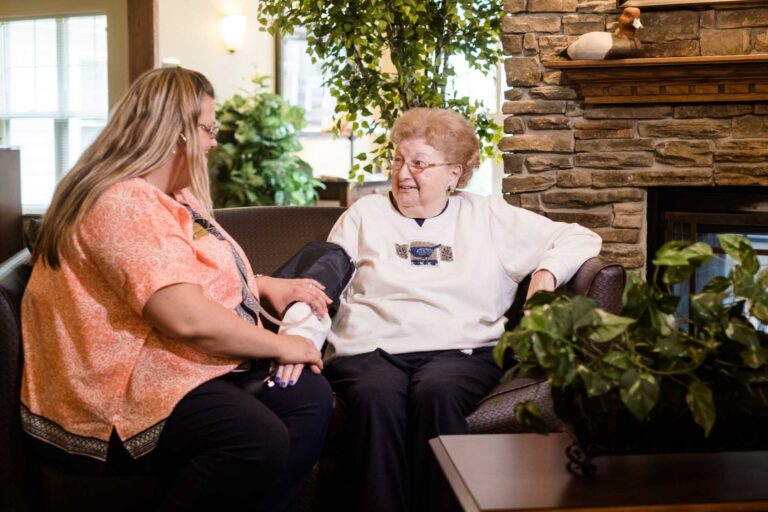
Private In-Home Care vs
Memory Care Community
Use our cost comparison sheet to see how much time and money you can save when you choose a dementia care community with these amazing offerings over private, in-home care!
All Heritage Memory Care
Community Offerings
Some of our modern services and amenities (which vary by location) include:
- Full-time licensed nurses
- Medication monitoring
- Caregivers working closely with nurses & physicians
- Ongoing staff training in memory care
- Three meals a day
- Personalized nutrition and dining programs
- Health and wellness programs
- Coordinated activities
- Secured building access for resident safety
- Sensory alarms for prompt assistance
- Uncomplicated design that eliminates dead-ends
- Interior garden courtyards
Heritage Memory Care Communities
in Wisconsin
Complete with state-of-the-art memory care services, Heritage offers a place for those with Alzheimer’s or dementia to live a relaxing, enriching life. To find a senior living community near you, check out all of our senior communities in Wisconsin! We offer Wisconsin Memory Care Services at the following communities:
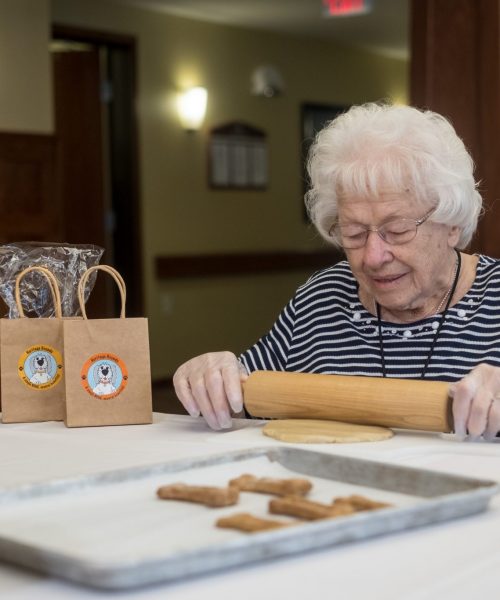
Experience the Difference
at Heritage Senior Living
See our state-of-the-art facilities and learn about our comprehensive services.
Come see why Heritage Senior Living is the premier choice for exceptional care. Explore our vibrant community and find the perfect fit for your loved one.

